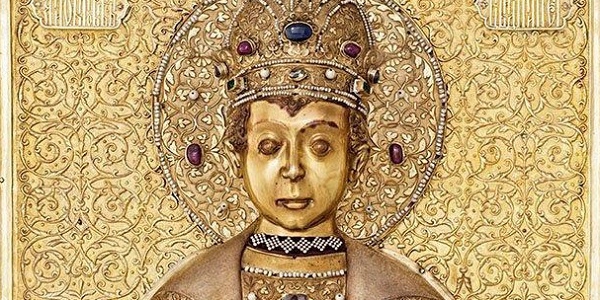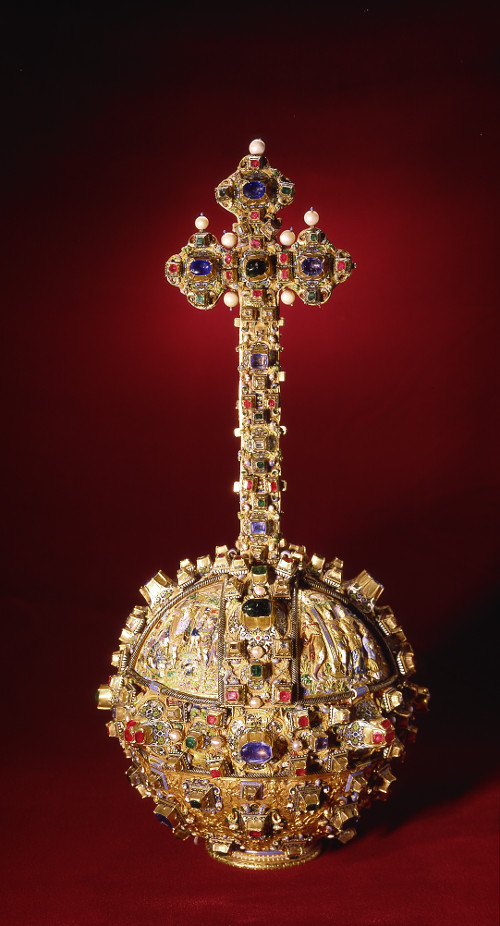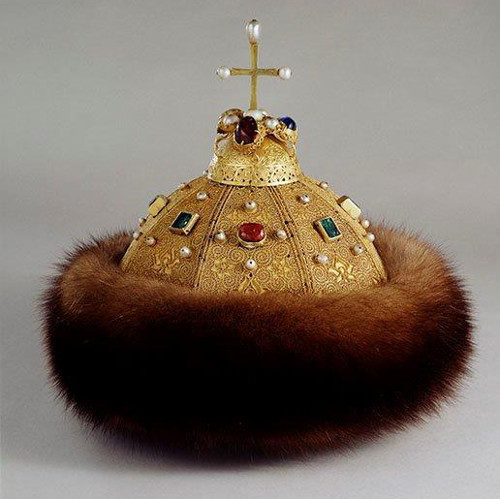- Учителю
- Эссе на английском языке«Образ Бориса Годунова в мировой культуре: живописи, музыке и литературе»
Эссе на английском языке«Образ Бориса Годунова в мировой культуре: живописи, музыке и литературе»
11
ФГУП Музеи Кремля и Образовательная компания «Релод»
Международный конкурс
Проект
«Единство в различии: Россия и Англо-говорящий Мир. Время для равных возможностей»
Эссе
«Образ Бориса Годунова в мировой культуре: живописи, музыке, литературе»
Работа выполнена: Гырляну Валерия
Студентка 1 курса
ГБПОУ Колледж полиции
Преподаватель: Овчарова Е. Ю.
Москва, 2016
FSUE Museums of the Moscow Kremlin and Educational Company «Relod»
The International competition
Project
«Unity in Diversity: Russia & the English-Speaking World»
Essay
«Boris Godunov in the World Culture: the Art, Music & Literature»
Made by: Valeriya Girlyanu
The 1st year student
Moscow Police college
English teacher: E. Ovcharova
Moscow, 2016
Theses
1. Many people better remember the major historical figures by works of the world culture and art, literature or music. Is there any similarity the literature image of Boris Godunov to the real historical figure? Only historical heritage can help us.
2. In the Moscow Kremlin I got sight of the exhibition, which is devoted to one of the best rulers in Russian history, Tsar Boris Godunov. Among the exhibited items I saw a set of regalia, confirming prestige of the Tsar.
3. There are some contradictions between the image of Godunov in literature and the real figure. Godunov's life was dramatised in memory of descendants by such Russian geniuses as A. Pushkin and A. Tolstoy, M. Mussorgsky.
4. Firstly, the authers presented Boris Godunov as the murder of Tsarevich Demetry. Actually, there is no clear evidence for this in historical documents.
5. Secondly, A. Pushkin accused the Tsar at the illegal seizure of power. To get back to the history I would like to say that Boris Godunov was the first legitimate monarch in Russia.
6. In Musorgsky's opera Boris was performed as a political figure, suffering from lack of love of the people. They turned away from him.
7. Unfortunately, Godunov's political activity over time was forgotten. Doubtless, Boris Godunov is a real outstanding historical figure. The Tsar raised the state prestige on the world stage.
8. In conclusion, it is my opinion that it would be fair if my contemporaries restore the status of Boris Godunov as one of the greatest European monarchs.
Many people better remember the major historical figures by works of the world culture and art, literature or music. Is there any similarity the literature image of Boris Godunov to the real historical figure? It's difficult to judge about him and about his activity, five centuries later. Only historical heritage can help us.
On my winter holidays I went to the Moscow Kremlin. In the Partiarchal Palace and in the Uspenskaya belfry I got sight of the exhibition, which is devoted to one of the best rulers in Russian history, Tsar Boris Godunov. A lot of people were standing and seeing exhibits highlighting the milestones in life of the Tsar. The visitors enjoyed. A special fascinating atmosphere was raining in the halls.
The exhibition featured more than hundred unique items of the 16th century from the collection of the Tretyakov Gallery, the State Hermitage Museum, the Museum of Fine Arts, the Pushkin Museum and others.
The organizers named the exhibition «Boris Godunov. From the servant till the Tsar of all Russia». In fact, the servant he was not, he came from landowners and started his career at the Court of Ivan the Terrible.
Nobility of origin was valued in Medieval Russia and the Godunovs cultivated the myth that their ancestor was a Tatar Prince Chet, who came to Russia in the 14th century and accepted baptism.
At the coronation of Tsar Feodor in 1584, Boris, the nobleman and his brother in law received honors and riches as a member of the regency council. In fact, he had a great influence at the court and he ruled the state instead of Tsar Feodor. Godunov went through a long and difficult way to the throne.
In 1598 Feodor died and Boris Godunov became the Russian Tsar. Among the exhibited items I saw a set of regalia such as the scepter, the orb, the Cap of Monomakh, confirming prestige of the Tsar. I'd like to point out that the exhibition creates an image one of the most progressive Russian monarchs.
I believe there are some contradictions between the image of Godunov in literature and the real person. Godunov's life was dramatised in memory of descendants by such Russian geniuses as A.Pushkin and A. Tolstoy in their tragedies, M. Mussorgsky in his Opera, Shalyapin on the stage and Shalyapin in his painting.
Firstly, the authers presented Boris Godunov as the murder of Tsarevich Demetry, a restless soul. The character of Pushkin's drama, Vorotinsky says:
"The infant's blood will certainly prevent him
To mount the throne and rule the country."
Mussorgsky's opera was based on the Pushkin's play where we see just an unfortunate man. He showed all majestically tragic musical characteristic of the Tsar. The small monologue Boris "Tribulation soul" and pathetic melody expresses all the many changes of his mood, state of his mind. Boris sees the retribution of heaven for the crime: "I have attained the highest power." On the other hand, there is no clear evidence for this in historical documents. It is wild guesses.
Secondly, Alexander Pushkin accused the Tsar at the illegal seizure of power: "Boris is not so humble! The former slave, the tartar, Malyuta's son-in-law." To get back to the history I would like to say that Boris Godunov was the first legitimate monarch in Russia. He came to power in the time of "oprichnina" and cruel tyranny prevailed during Ivan the Terrible reign was stopped. Boris Godunov was able to save the humanity and did not become the new despot, no matter how the different circumstances forced him to it.
In the second edition of the monologue Boris was performed as a political figure, suffering from lack of love of the people, and as a man wearing of remorse. According to the author, people saw in Boris the cause of all the troubles, misfortunes, which happened with anyone and anywhere. They turned away from him, seeing in him a despot. Here the Godunov's words: "We only can restrain the people by being vigilantly strict." People went to the side of the False Demetry, sacking him from the throne, "the crowd of madmen will take advantage of Dimitry's resurrected name." Pushkin always was a freethinker for readers, so it is not surprising that people is the main character of the work.
Unfortunately, Godunov's political activity over time was forgotten.
Yes, Godunov arranged the feudal regime and promoted the interests of the gentry, but he also strengthened the power of Russia, its borders and raised the state prestige on the world stage. The Tsar held successful military actions, reformed the judicial system and undertook many other domestic reforms. During his rule, the Russian Orthodox Church was received its patriarchate. Boris Godunov is a real outstanding historical figure.
Moreover, in foreign policy Godunov was a talented diplomat. He was one of the first rulers of Russia, who sent the noble youth to study abroad. He invited the foreigners to service, releasing them from paying taxes. The tsar even wanted to invite the scientists from Europe in order to found in Moscow a high school where would be taught different languages. The stroller, gifted by British diplomats, was an evidence of his relationship with Queen Elithabeth I. During his reign he promoted foreign trade and signed some peace treaties with other countries.
In conclusion, it is my opinion that it would be fair if my contemporaries restore the status of Boris Godunov as one of the greatest European monarchs, in spite of he was "Mysterious mixture of good and evil".
"The time of Boris Godunov was reflected well in literature, cinema, but very little in terms of objective history and I hope that this exhibition will help close the gap," - said the head of the presidential administration of Russia, Sergey Ivanov. I agree with the saying.
References:
-
Общий обзор Бориса Годунова. В.С. Блеклов.
[Электронный ресурс]: slovari.yandex.ru/dict/liten</.
2. Tatiana V. Chumakova. "Britain and Russian culture in the middle ages", 2005.
3. Александр Пушкин. Драматические произведения. Борис Годунов.
4. Скрынников Р.Г. "Борис Годунов" М.; Наука, 1983
5. The Editor of Encyclopedia Britannica: Boris Godunov, Tsar of Russia.
6. Olga A. Pilkington, "Spring Always Comes after Winter", 2005.
7. Борис Годунов в отечественной исторической литературе.
nsportal.ru>2014/09/21/boris-godunov-v…literature
8. Историческая литература XVIII - начала XX вв. о Борисе Годунове. Морозова Е.Н. Смутное время в России. М.: 2002. с.159
9. Личность Бориса Годунова - Русская Литература
10. Карамзин Н.М. История государства Российского. М.: «Альфа-Книга», 2008, c.969.
11. Корецкий В.И. Закрепощение крестьян и классовая борьба в России. М.,1986, с.128
12. Сахаров А.Н. Смута в Московском государстве. М.: «Современник», 1989г., с.135
Appendix 1
Portrait of Tsar Boris Godunov

Appendix 2
Orb

Appendix 3
Monomakh's cap
